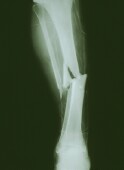
WEDNESDAY, May 12 (HealthDay News) — A new study finds no association between the use of a popular class of osteoporosis medications known as bisphosphonates and an unusual type of thigh bone fracture.
Bisphosphonates include blockbuster drugs such as alendronate (Fosamax), risedronate (Actonel) and ibandronate (Boniva).
The conclusions, appearing as a letter-to-the-editor in the May 13 issue of the New England Journal of Medicine, do little to settle an ongoing debate about whether or not these drugs cause this type of rare fracture.
A pharmaceutical-company sponsored study published in March in the same journal concluded that bisphosphonates did not boost people’s risk for this type of fracture, although prior studies had suggested they did.
That “very large study,” said Dr. Kenneth A. Egol, chief of the Orthopaedic Trauma Service at New York University Hospital for Joint Diseases, “certainly can allay some fears regarding the drug.”
And the current study, which is much smaller, should not raise fears or affect how bisphosphonates are used, experts said.
“We believe these are good drugs in the right patient, and there’s no reason they should not be used,” Egol said.
“We cannot conclude that there’s major enough of a side effect that we should be telling patients not to take the medications, and that’s consistent with what the FDA [U.S. Food and Drug Administration] is saying,” agreed Yuen Ting (Cathy) Lau, an assistant professor of pharmacy practice at Texas A&M Health Science Center Irma Lerma Rangel College of Pharmacy in Houston. “There’s no conclusive evidence saying that atypical bone fractures are associated with bisphosphonates and, given the benefits, patients should not stop taking them just because of this concern.”
Having said that, Egol did point out that “those who take care of patients with fractures have definitely been seeing this atypical type of femur [thigh] fracture in a subset of, but not all, patients who have been on medication for a long period of time.”
The next step, he said, would be to figure out which subset of patients may be at heightened risk for the breaks.
The authors of the study, from the University of Sydney in Australia, reviewed records on 152 femoral fractures in 152 patients between 2003 and 2008. Most of the patients were women, with a mean age of 78.
Seventeen of 20 patients who had one of these unusual fractures were taking bisphosphonates (15 were taking Fosamax for an average of five years and two were taking Actonel for about three years).
Two patients who had not had such fractures were taking Fosamax and one was taking Actonel.
There were also other risk factors associated with the type of fracture, such as steroid treatment for more than six months or having rheumatoid arthritis.
More information
Learn more about osteoporosis medications at the National Osteoporosis Foundation.

